The meaningful choices that made Stray Gods developer Summerfall Studios
During an incredibly candid closing keynote at GCAP 2023, four members of the Summerfall team recalled how the studio has evolved for the better since its inception.
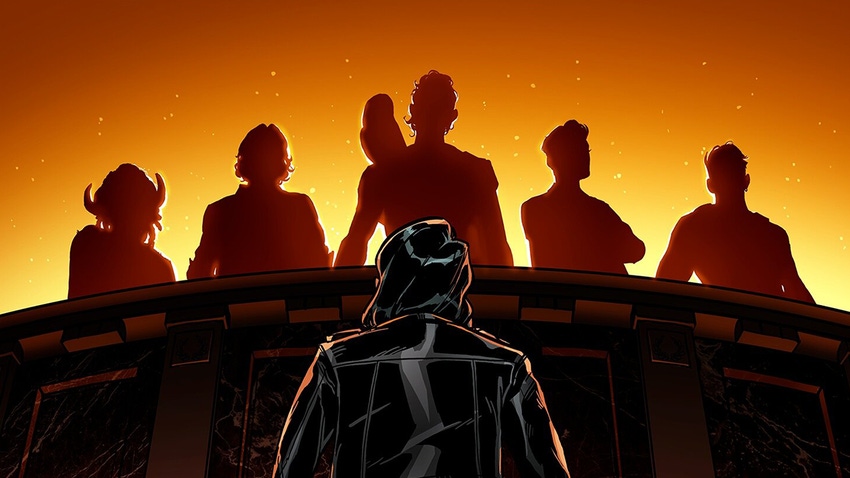
Summerfall Studios' debut title Stray Gods is a roleplaying musical where choices matter. It's only been a few weeks since the game debuted, but since then, Summerfall has been inundated with praise for crafting a vibrant mythical adventure about hope, self-discovery, and forging your own path.
The success of Stray Gods, which was just crowned Game of the Year at the 2023 Australian Game Development Awards, wasn't a happy accident. As is the case with most things in life, we're sure lady luck played her part–but as Stray Gods itself hammers home: choices matter.
During a brave and incredibly candid closing keynote at GCAP 2023, four members of the Summerfall team recalled how the studio has evolved since its inception by choosing to be proactive in creating a positive culture while also learning from its mistakes to protect, empower, and support its employees.
Acknowledge your mistakes and listen to your employees
Describing some of her experiences in the industry prior to joining Summerfall, Stray Gods lead story artist Sasha Mutch recalls how she was five years into her animation career and preparing to move to Canada to work on a "pretty B-grade animated feature" when she finally received the script. It was, in her words, the "second-most sexist and racist" script she'd ever read. The first, if you're wondering, blamed a woman for being sexually assaulted because she'd had a drink at a bar.
It was an experience that left Sasha "jaded as hell," and she eventually turned down the job in Canada, although she neglected to mention why to her would-be employers. "I totally should've said something more about the script, but that's what this talk is about," she explains. After that, Sasha turned to freelancing and worked on some neat projects, but she never really felt like she'd found a studio for her. Eventually, she spotted a vacancy for a story artist at Summerfall. The role didn't pay as well as some of the others she'd seen, and it was an awkward-sized contract, but the project struck a chord with her—as did the studio's pledge that it cared about the health and voices of the people it wanted to hire.
"I applied, and it went pretty well. I got hired. People were super nice. Mental health was a big part of the company's goals [...] and I was really getting my hopes up. Then 'two weeks in' happened. Our main character Grace had a redesign where she wore some really stunning high-waisted jeans. This was a redesign done by Jessica Lee (character artist) and Benjamin Ee (art director) to modernize her look to fit her current age and aesthetic.
"A comment was made, and it was kind of blasé, but it was 'anyone with an arse would never be caught dead in those.' And I got a little confused. I thought, 'shouldn't Summerfall be embracing a healthy body image and self-love?'" Despite feeling unsure about what to do, Sasha raised the issue during a one-on-one with Benjamin Ee and suggested that, while she didn't want to "get fired or anything," the remark had made her feel slightly ashamed for wearing similar clothing.
"Then, Ben said something that stayed with me for a long time, which was 'Oh, I'm so sorry you feel like you could get fired for saying something like this,' and it made me reflect. Why did I feel uncomfortable speaking out? It's because at a previous workplace, there had been a racially based sexual harassment issue brought up to HR, but [it was] the person who was being sexually harassed that was quietly let go."
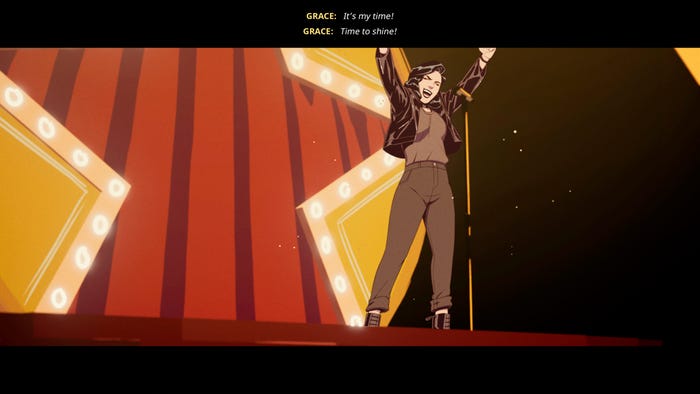
This had happened before Sasha had joined the company, and yet it took months after she was there before the whisper networks finally reached her. "Nobody wanted to talk about it. Everybody was scared. I'm scared," said a visibly emotional Sasha. "Of course, the harasser was promoted, praised, and provided for while the rest of the team felt like they couldn't speak up. When this happens, you, as employers, are telling your employees they have to make a choice. That they have to choose between their financial safety and their workplace safety–and let's be honest, most of us live in a capitalist society where we have to pay to live, so it's not a choice."
At that juncture, Sasha had a decision to make. She asked herself if she truly wanted to work at Summerfall and potentially end up staying at another studio where people could only speak in whisper networks. She ultimately decided that if there was ever a time to push back, it was now.
"Look, I'm two weeks in? I think it'd be fine to get fired then," she jokes. "So I did speak up. I did so very awkwardly and I blundered through it, but I really wanted to let the team know that people should take pride in their body image and that's what we want to represent through our character design–and it worked."
The studio took her comments seriously and set about tweaking Grace's design to approve some "beautiful jeans" with some slightly minor changes. "It felt really good. It felt really good to be listened to and not have something like this fester. This made me more confident in my job. Originally the contract was for six months and I've been here for three years now," says Sasha.
"Give your employees the platform to speak up–even on minor issues. You don't know where they've worked before and what they've had to deal with, or what they've seen other people have to deal with. Because let's be honest, that first incident is not uncommon and it shouldn't exist."
Sasha acknowledges that Summerfall still isn't perfect but says the studio has empowered its team to air their grievances in order to do better. "Being able to speak up made me confident in my job and improved my own work ethic," adds Sasha, who is now also co-art director alongside Ee.
Value people, not their outputs
Summerfall cinematics lead Olivia Ong has her own story. After working in the motion graphics industry for a decade, she landed a role at Summerfall as the studio's first cinematics editor. The job was daunting, not least because Olivia was the sole person in the role—which is something she'd never experienced before. "In television I worked alongside up to 20 other designers. I always had more senior members to bounce ideas off and learn from," she says. "The pipeline was refined and what I did was common knowledge. But suddenly at Summerfall, there was one cinematics editor and that person was me."
After a tentative first week, Olivia became comfortable putting together sequences in Stray Gods and the whole studio was hard at work improving the pipeline. With so many sequences needing work, however, Sumerfall set about rapidly expanding the cinematics team, and soon Olivia had a team of seven colleagues that needed training. In fact, she notes that if you include team members from other disciplines who were also asked to help out, she trained around a dozen people to do cinematics editing over the course of production.
"When it came time to teach, my confidence would take a hit," she says. "I don't enjoy telling others what to do, but at Summerfall our new cinematics editors were early in their careers and many were new to animation or film. I was very aware of how much there was to learn. I was daunted by the sheer amount of topics I had to cover in order for them to reach a good comfort level."
To help structure and streamline onboarding, Olivia wrote a bunch of Confluence pages and guidelines to share her expertise. Despite that, she would often implement time-saving workarounds in her own time and forget to share with the team. Frustrated by those lapses, she organized a weekly cinematics meeting to share tips and tricks. Over time, other team members pitched in more and more, and that encouraged a culture of teaching and sharing regardless of skill or seniority.
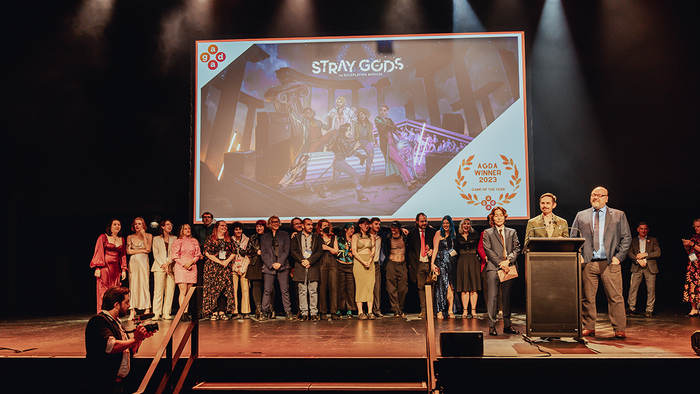
That's a clear win on a studio level, but Olivia says her role had quickly evolved from "keeping my head down in Unreal sequencer to talking, teaching, organizing and planning." It soon became overwhelming. There were days when she'd get carried away answering questions and completely forget that she was also supposed to implement a bunch of sequences before clocking off. "My cinematics editing work slowed down and it stressed me out," she says. "Then, one day to my surprise [Summerfall co-founder] Liam explained the studio was making me cinematics lead. I felt seen and appreciated, but in my mind I was treading water.
"Sometime around then, I was talking to friends and colleagues, and I was alarmed to learn there's a group of people who don't struggle with keeping time, focus, memory, and motivation. These people are called neurotypical people. It sounded made up."
A few months before Stray Gods launched, Olivia was diagnosed with ADHD. After hearing the news, she felt "surprise, sadness, and relief all at once." Crucially, though, she was able to finally stop internalizing blame and begin learning how to organize her workflow in a way that worked for her. When Summerfall learned about the diagnosis, studio leadership reassured her that getting confused occasionally didn't detract from her work and began putting processes and structures in place—such as providing more assistance when it came to organizing and planning—to alleviate some pressure.
"When I first interviewed for the role, I was impressed by how the company valued self-care. I learned about the concept of taking leave as a preventative thing to do to avoid burnout. People in the office were talking about going to mental and physical therapy as a matter of maintenance, not just a thing you do when you're in a crisis," recalls Olivia. "I now see the flow-on effect of this policy. The studio values the person and not just their output. At the end of the day, Summerfall cared less about the tools I made and more about how those tools helped me cope with leading. In August, we shipped a great game. At a different studio, I might be burnt out by now, but I'm not. I'm fresh thanks to self-care and a supportive team, and I'm here to stay."
Create springboards for emerging talent
Long before becoming a cinematics editor at Summerfall, Ethan Taylor carved a path into the industry by creating fan animations for his favorite podcast. A meeting with the creators of that very podcast (which a very reluctant Taylor was ushered towards by his mom) eventually landed him a job, letting him rack up some experience before joining Summerfall to work on Stray Gods.
It might sound like a pretty innocuous origin story, but pursuing a job in the games industry wasn't an easy choice for Taylor. He'd always dreamed of driving large-scope projects but had some pretty serious reservations about committing to a future in games. Taylor says he'd heard the stories from around the industry, tales of juniors being turned into cogs in the churning production machine instead of being nurtured and provided with room to grow.
"I was almost scared off before I even started," he says. "I nearly talked myself out of applying for the Summerfall job. It took having a friend, Lily, who's also on the cinematics team, offering to send my portfolio over after insisting that I'd be a great fit."
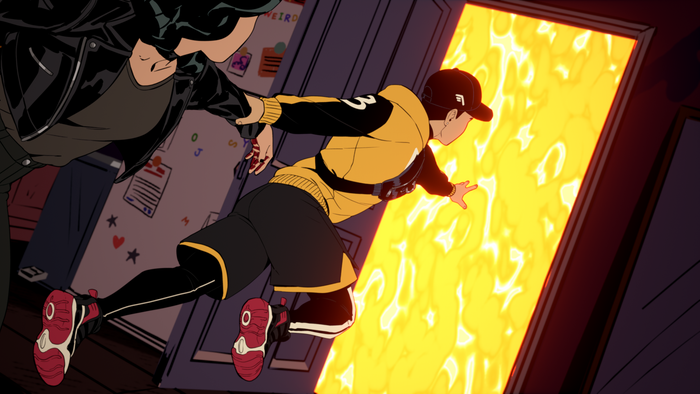
Taylor says it's a situation that highlighted a pattern he'd yet to fully understand, but that's a point for later. Fast-forward to his time at Summerfall, and Taylor was eventually offered the chance to work on a part of Stray Gods that was outside his discipline and would see him diving into Unreal Engine blueprints. "I'd been wanting to learn blueprints for my own projects, so I was keen for the chance to tinker around," says Taylor. "But I didn't realize that part of the reason I had this opportunity was my own doing.
"When I told Liam how eager I was to take this task on he responded with 'yeah, I thought you would be.' It started to click. I'd discussed things that interested me in game development and what I was looking to learn for my own projects during conversations around the office and my one-on-one catch-ups with Liam. I just hadn't realized those curiosities were actually being taken on board."
Taylor describes the one-on-one process at Summerfall as being "crucial" in allowing him to relay his feelings and career aspirations to management. Although he wasn't able to articulate what he felt he needed in order to grow during his earliest days at the company, those constant conversations with leadership figures allowed him to dial into the process and help manifest new pathways internally. Of course, conversations are a two-way street, and Taylor says his progression is the result of "having those aspirations being heard."
"I'm now a storyboard artist in addition to cinematics editor. This has been a huge jump forward and a very scary one too, but it's one I think is possible because of everything I've learned. I've felt supported through this extra responsibility as well, with consistent reviews and lessons related to this new discipline. It feels like I'm being encouraged to grow beyond where I started and continue down my path," continues Taylor. "Learning to take action and express my goals in an environment that was ready and eager to support that has given me a much clearer picture of what the path ahead could look like."
Care for the people who make your games
"The game development industry has a tendency to prioritize making more games for people, rather than caring about the people that make those games. And I think it's time to change that," says Alissa Vovers, Summerfall junior programmer, explaining why they had reservations about taking a full-time job in the games industry.
"I knew game developers had a five-year career expectancy and that the industry has a history of discrimination, crunch culture, mass layoffs, and seemingly inevitable burnout," they continue. Despite those reservations, Vovers was still interested in making games and reached out to Summerfall engineering director Troy Ferguson to ask him straight up if everything they'd heard was true. His answer? "It has been so far." It was a blunt answer, but his candor gave Vovers cause for optimism, and they decided to try anyway.
During the interview process, Vovers was asked to describe the potential challenges they expected to encounter. They weren't worried about the work, but had some concerns about the social aspects of studio life. "My particular blend of neurodivergence and anxiety means that talking to people is not my comfort zone, but I was excited about the project. I wanted to work with such an experienced and skilled team and believed in their idea of a compassionate culture," they explain.
Vovers says the team showed "nothing but kindness and support since day one," but they still found working in an office with people they didn't know overwhelming. It was hard to join in, and by the end of each day, they were physically, socially, and mentally exhausted. Then, one experience changed everything.
"I was having a rough day. So I took a break. I went for a walk, and something happened that affected my mental health. I came back, and I was visibly upset, trying to hold myself together and failing and crying, and there was an immediate rush of concern from everyone there," says Vovers. "They treated me with gentleness and gave me hugs and suggested I take a mental health day and go home. I hadn't even considered that leaving was an option, but they reassured me that it was a normal practice."
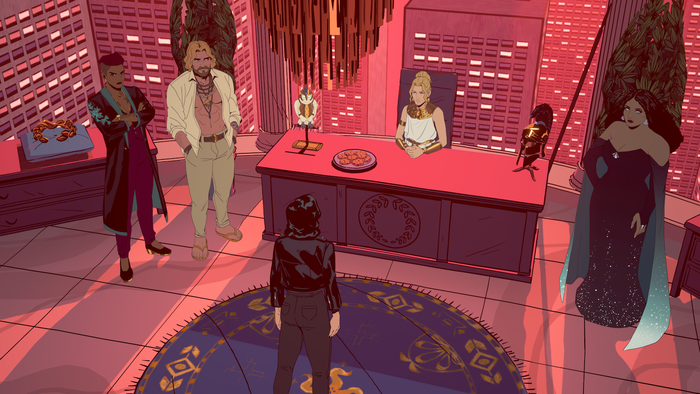
Vovers says they felt cared for and accepted, and noted the team's support extended beyond those "big moments." It was the little consistent acts that made them feel at ease. A co-worker grabbing them a coffee when they were stuck in endless meetings or telling another colleague to stop at the end of the day so they don't overwork. "The culture Summerfall created is one that everyone takes part in, where communication is encouraged through playful discussion and mutual support. But you also have to know how to support yourself," Vovers continues.
"Speaking up when you're struggling can be incredibly intimidating. Working at Summerfall isn't magically perfect. We've had plenty of issues crop up, but that just means we know there's more things we need to do to support each other."
That means making sure there's space to share your concerns. Summerfall arranges regular retrospectives at the end of each sprint, allowing the team to discuss what went well, things that could've been better, and what went wrong. It's about taking the chance to be open and giving others the opportunity to help. That doesn't mean development suddenly becomes stress-free, but it does make it easier to implement practical solutions.
"For Troy and I, the end of production was a mess. We were constantly fixing bugs, and more were coming in from QA each day. I was overwhelmed and stressed out. I talked about it with Troy, and then we went to Elizabeth Blythe, our studio development director, to let her know what was going on," continues Vovers. "She took immediate action, prioritizing and sorting the bugs, cleaning up the ones that weren't relevant or we had actually already fixed, and bringing in people from other disciplines to help us out. It worked. The pressure eased. And while it was intense, it wasn't overwhelming."
Vovers spoke up because they knew it was safe. By fostering that environment, Summerfall allowed its employees to work more effectively as individuals and as a team. Vovers believes it's a lesson that can be applied by studios of all sizes. "We don't make games for ourselves. We make them for other people," they add. "When you care about what you do people can feel it. They can feel how much your team cares and you can make something truly magical.
"Building that feeling of trust and safety is crucial in our industry. It allows people to have the space to breathe and take some time off to rest. To perhaps go for walks in the bush or do therapy and come back invigorated, ready to be excited and silly and creative."
Game Developer was invited to GCAP and Melbourne International Games Week by Creative Victoria, which covered flights and accommodation.
Read more about:
FeaturesAbout the Author(s)
You May Also Like













